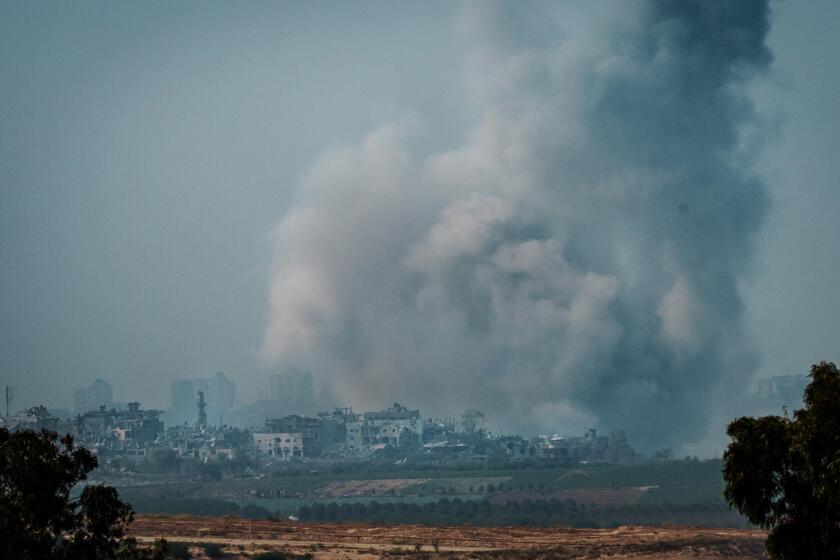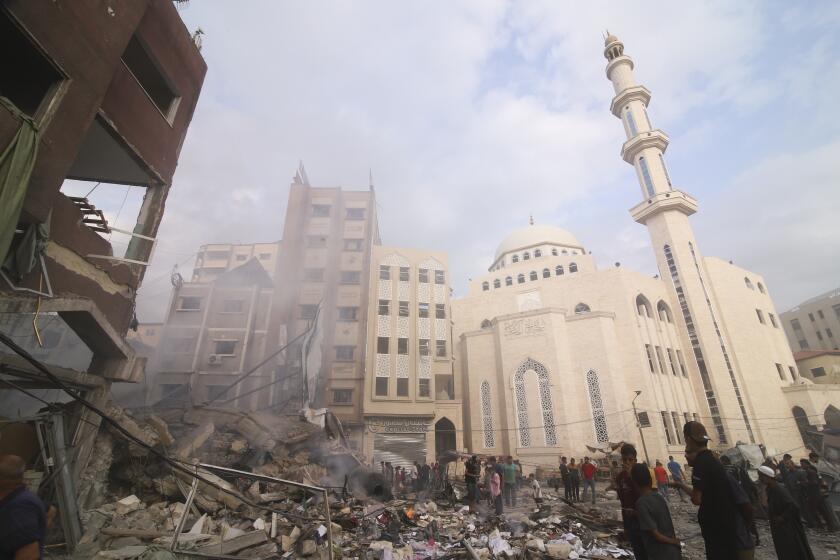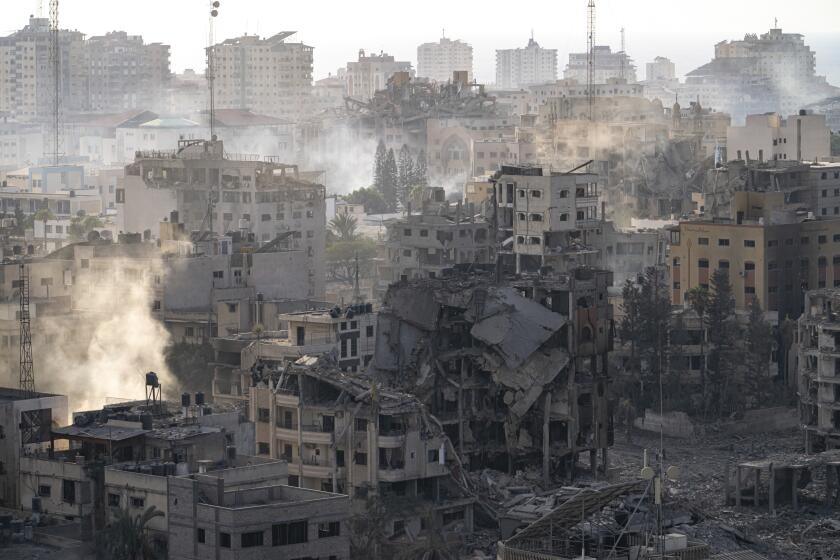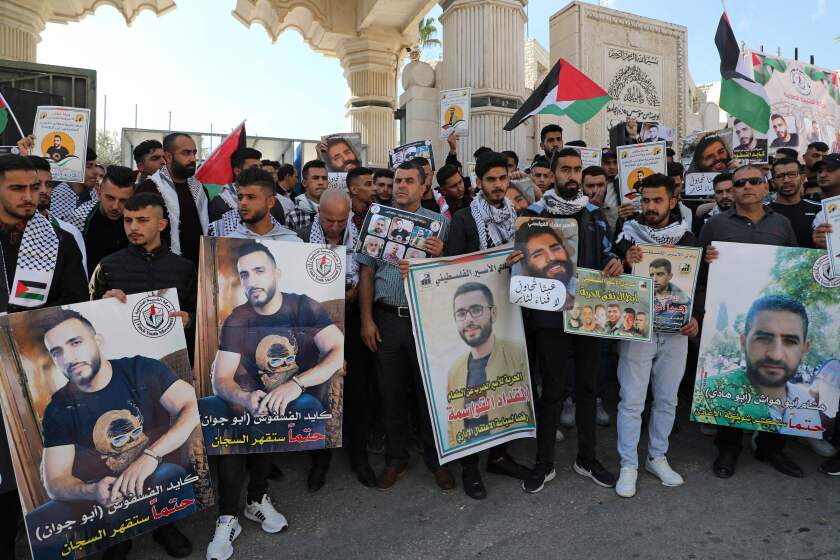I am a Palestinian journalist from Gaza. I fear a media blackout of the war
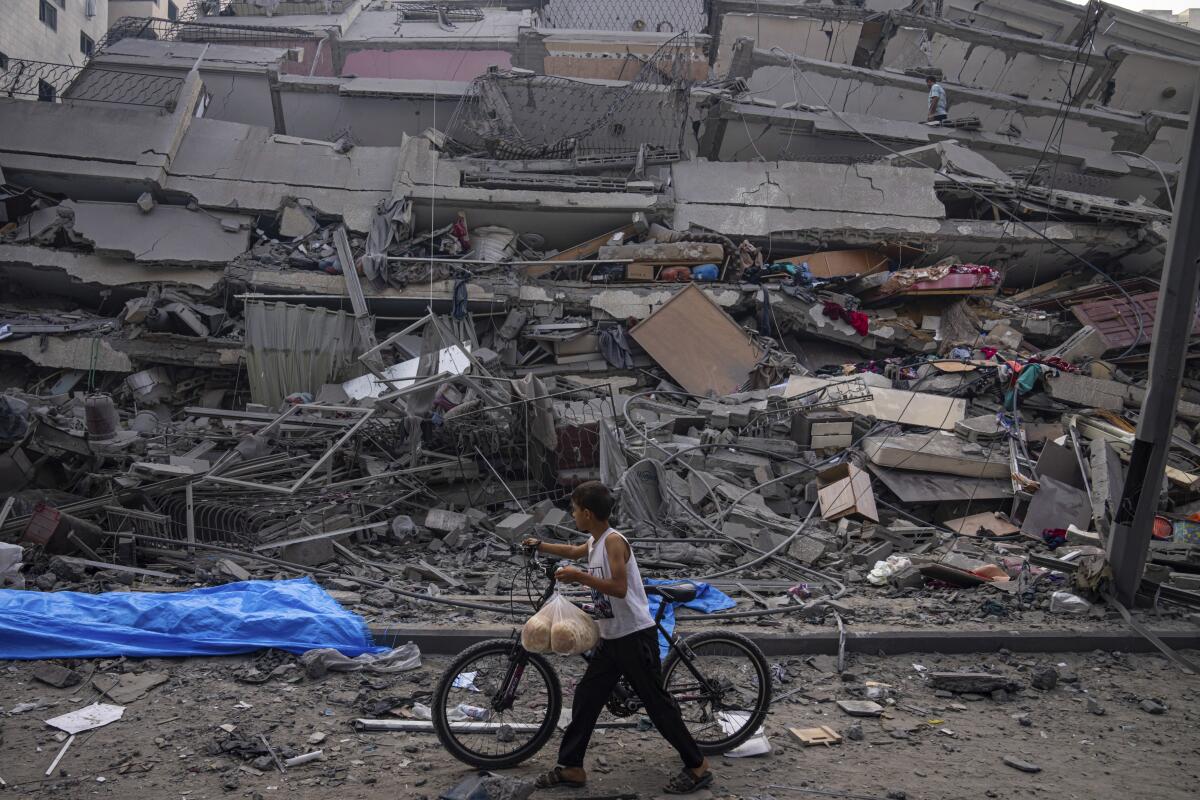
- Share via
I met Ibrahim Lafi for the first time in 2021. I’d returned home to the besieged Gaza Strip after being in the U.K. for six years, unable to go back because of Israel’s blockade there.
I was an intern at Ain Media, where Ibrahim also worked as a journalist. We have talked every day ever since. He was like a brother who gave me advice when I needed it. He brought sunshine to my life. We covered the 2022 Israeli aggression on Gaza together. He promised me that we would report on every war together. He would be the cameraman, and I, the television reporter. Our friendship made Gaza, the biggest open-air prison in the world, vast and full of possibilities. But now he has become the news that I must report on.
The Israeli military said in a statement on Saturday night that it was preparing a coordinated offensive in Gaza using air, ground and naval forces.
On Saturday morning, I was at home in London as news of heavy Israeli bombardment in Gaza was all over my phone. There were more than 300 messages from different group chats. I went to check the one where Ibrahim was most active, as we were all used to him breaking news before anyone else. He said: “The situation is escalating. I am going into the office.” Soon after, I texted him to take care, to update me on his location and to tell me if I could help. But I became worried when he didn’t reply, and it appeared his phone was off. While asking others if they’d heard anything, a colleague said: “Ibrahim is missing.”
I called everyone I knew in Gaza, trying to gather any news about Ibrahim. I called other journalists on the ground and asked if they knew anything. One reporter informed me that many journalists were missing. Minutes later, he said to me, “We found Lafi.” Nothing else. That was Ibrahim’s last name, but I wasn’t certain if it was him. I felt like my lungs had collapsed as I frantically tried to find out what happened — this is a feeling many Palestinians are experiencing: not knowing of their loved ones’ whereabouts in Gaza.
Prime Minister Benjamin Netanyahu and a leading opposition figure have created a wartime Cabinet to oversee Israel’s latest war against Hamas.
After many messages and calls, the news came: Ibrahim was killed. Israeli missiles took his life. Everything was a blur after that. All I can remember is that my mum was on the phone with me, and my flatmates were suddenly in my room. I was screaming, crying and unable to breathe. Ibrahim, my best friend, is gone. It felt like my world had completely ended.
Many of Gaza’s inhabitants moved there as refugees who had been dispossessed from lands where Israeli settlers now live. Gaza has been under a sea, land and air blockade since 2007. Since then, the Israeli military has carried out multiple deadly offensives against the Gaza Strip. On Saturday, Hamas, the ruling party in Gaza, launched rockets into Israeli settlements and managed to break into the settlements surrounding the strip. Hamas carried out attacks that have left 1,200 people dead.
By rewarding Israel’s far-right extremists and castigating the moderates, Prime Minister Benjamin Netanyahu believed that he had finally found the solution to the Middle East conflict.
Israel has declared war against the besieged enclave and ordered a “complete siege” of the already-blockaded Gaza Strip, stopping supplies of all power, fuel, water and food. At least 1,417 Palestinians have been killed, including 447 children, and nearly 6,300 have been injured, according to the Palestinian Ministry of Health.
When Ibrahim was killed, he was wearing his vest and helmet labeled “Press.” My colleagues who were on the ground reporting with Ibrahim emphasized to me that he was not caught in clashes between Palestinian fighters and Israeli soldiers, but was actually targeted by heavy bombardment, when two missiles fell on the street he was in at the Erez border crossing. I feel compelled to establish him as a “perfect victim” to convince the callous world of his humanity. But that doesn’t matter. Whether you are resisting the occupation or burrowing your head in the sand, no one in Gaza is safe.
I have two other colleagues, Nidal Alwaheidi and Haitham Abdelwahed, who are still missing. Also on Saturday, a television crew from Sky News Arabia reported Israeli police assaulted them and damaged their equipment. In the last few days, at least seven Palestinian journalists have been killed by the Israeli military airstrikes. But this is not the first time journalists have been among those targeted in Gaza. In 2021, Israel bombed international press offices, including those of Al Jazeera and the Associated Press, as well as many other Palestinian media offices.
Israel’s latest move is an attack on Palestinian civil society organizations that would outlaw our work and even criminalizes public expressions of support.
Right now, my journalist colleagues who are still alive in Gaza are not only grieving their slain peers, but feel under severe threat themselves. Most of them have no access to the internet or electricity. Gaza is facing a complete media blackout. Many of my friends and people I know in Gaza have been calling me with pleas, asking that journalists come and cover what is happening in their areas that are nearly impossible to access because of the heavy and indiscriminate bombardment. It’s as though entire neighborhoods, innocent souls and dreams are being obliterated without anyone knowing.
My family and friends describe Gaza as completely unrecognizable and looking like it’s been wiped off the map. The United Nations has warned of a looming humanitarian crisis. If the world does not act quickly, we are close to losing the voices of truth, as Gaza’s 2 million residents face being killed, and those who survive, a terrifying future.
Yara Eid is a 23-year-old war journalist and human rights advocate from Gaza. @eid_yara
More to Read
A cure for the common opinion
Get thought-provoking perspectives with our weekly newsletter.
You may occasionally receive promotional content from the Los Angeles Times.
